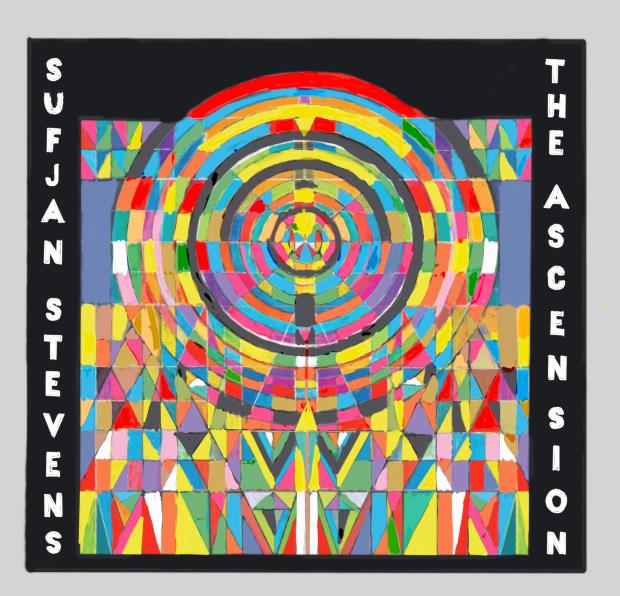Sufjan Stevens’ “The Ascension” provides for a futuristic and transcending masterpiece
Sufjan Stevens combines a new experimental sound with social commentary alluding to his religion on new album “The Ascension”
October 12, 2020
On Sept. 25, 2020, singer and songwriter Sufjan Stevens released his eighth studio album “The Ascension,” a warped and futuristic piece that combines Stevens’ view of religion with his experimental music style that differs greatly from his previous, more emotional albums.
Stevens begins the album with the opening track, “Make Me An Offer I Cannot Refuse.” The instrumentals at the very start form a futuristic tone that prepares listeners for the journey they are about to embark on. Sufjan then enters with his soft and almost whisper-like voice that listeners are so accustomed to hearing. He layers his voice with complex and robotic-like sounds that are awkward for listeners, almost uncomfortable, as the pairing is unusual. He then transitions into an intense, almost EDM like sound, and then back into Sufjan’s gentle voice, a pattern that he continues for the entirety of the song, leaving listeners on their feet, guessing for what the next beat will bring to their ears. The multiple build-ups in the song don’t reach a certain climax, but fade back into a gentle and almost eerie tune, as if some sort of resolution is expected, but never comes. Lyrics such as, “Move through to me/Show me the face of all my dreams,” is Sufjan almost asking for proof and affirmation that there is actually a divine force that exists after being told for so long to believe in one.
The next track, “Run Away With Me,” displays a stark contrast from the opening track, as Sufjan’s emotional and soft voice is what stands out the most. He has paired this angelic voice so perfectly with a soft-electro beat, a difficult task to accomplish. Despite this, he is missing the strum of a guitar that Stevens is so well-known for, though in this case, the guitar is not needed to have the same emotionally jarring effect. There is a sort of escapism concept that Sufjan aims for in this song, and it is done beautifully, making it one of the favorites from the album.
“Video Game” begins like the bells of a church ringing, but with an electronic twist. The song is much more upbeat, with a steady beat of the drum. Sufjan incorporates an almost cosmic-like instrumental in snippets, adding another layer to the song. “Video Game” alludes to the presence of social media in this generation’s everyday life, and how toxic it has become. “Social media has exacerbated celebrity culture and idol worship,” Sufjan says. It monetizes us, it commodifies human instinct. There’s a loss of identity within that transaction. Moreover, systemic racism is nothing new. Corporate greed is nothing new. Political corruption is old as the hills. It’s just now that we’ve built a system in which all of these social diseases are visible and exposed. In some cases, they’re being celebrated and it’s pretty ugly,” Stevens explains in an interview with Al Horner for The Guardian.
The album continues into fourth track “Lamentations,” which includes a very groovy and funky intro that transitions into a distorted composition of sounds. However, he once again smoothly makes his presence known in the song with his signature style of almost no strength behind his voice, solely relying on gentle whispers and a distorted effect behind his voice. He keeps a similar theme of experimentation with the album that is beautifully mixed and composed, almost angelic aside from the funky background that is consistent with the beginning of the song. The last 30 seconds of the song brings listeners into another dimension, where one can become completely lost in the waves of faltering harmony.
“Tell Me You Love Me” is a personal favorite, as it starts off with a sweet and gentle pattern of notes. Sufjan incorporates a distorted and delayed effect to the music, but also has multiple voices come together to send a more powerful message. Once again, Steven’s ability to blend these sounds at perfection is what stands out in this album. Listeners then enter a cosmic instrumental that is seen in prior songs, but he doesn’t waver from the same six note pattern that was played at the very beginning of the track. The last minute of the song is almost indescribable, so beautifully composed and well-thought out, technical but emotional at the same time.
Sufjan begins the track by claiming “My love, I’ve lost my faith in everything,” however, towards the end of the song, writes it so that God is responding that despite Stevens losing faith, God will still love him, hence the repetition of “I’m gonna love you”.
“Die Happy” and “Ativan” are both almost purely instrumental pieces that combine the similar theme of this comfort and softness that Stevens brings, along with the discomfort of metal clanking, distorted voices, and an unsteady beat of the drum that directly contrasts his voice. Stevens seems to be heavily inspired by electronic music, especially in the last segments of both of these songs, which, yet again, differs greatly from his previous albums that consisted of his acoustic guitar and whispered voice.
“Landslide” is another personal favorite off the album, however, as opposed to “Tell Me You Love Me,” Stevens begins with a cryptic pattern of notes and an even more mysterious tone from his own voice that listeners are not familiar with. The chorus is a simple and well balanced composition, but soon segues into the first time Sufjan brings power to his voice on the album, in directly contrasting his airy and light one, a satisfying shock to listeners. Sufjan’s range is exemplified further in this song, as his voice reaches into a falsetto and easily shifts into his powerful register without a hint of unsteadiness.
The tenth track on the album, “Gilgamesh,” begins like the music played over the opening of a patriotic movie. This soon comes to an abrupt stop as a crumbling and dismantled sound takes over in which Sufjan layers his voice over. The storyline and lyrics behind this song is what makes Stevens stand out as a musician and lyricist, using the story of Gilgamesh and Enkidu as a religious allegory to the message he attempts to send regarding anxiety and the lessons he has learned over time regarding the complexities of life. “For as it was in the beginning/So shall it cease at my command” alludes to the epic of Gilgamesh, more specifically the uncertainty of life even when one has faith in a high power or entity. In the epic, Enkidu and Gilgamesh make a cedar door to honor the Gods, however, Gods are still unsatisfied and kill Enkidu. Humanity is taught to worship the gods, but the gods ignore that in self interest. Stevens relates this to the importance of appreciating the people that are in your life while they are still here. The line “as it was in the beginning” hints in Sufjan’s conclusion that the world was created by the gods, and humanity was created to serve the gods.
“Death Star” segues perfectly into “Goodbye To All That,” leaving listeners unaware that the next song has already begun. At this point in the album, songs that are similar in composition tend to become morphed into one, and it is harder to find distinctions between them. Still, “Goodbye To All That” has a more optimistic tune despite the crushing lyrics.
Despite the album being a masterpiece in itself thus far, the final twelve minute and thirty second track, “America”, will leave listeners will a bittersweet afterthought on the state of the country at the moment. The warped symphony created behind Sufjan’s voice provides for the destruction and chaos he feels is present in America, and connects it back to his faith in God with lyrics such as “Don’t do to me what you did to America.” Sufjan is begging God not to abandon him into a state of chaos, just as God has done with America. Sufjan continues to provide religious allegory regarding Christianity, with lyrics such as “I have broke your bread for a splendor of machinery.” This refers to the exploitation of American land for technological advancements. In Christian faith, the bread that was broken refers to Christ’s body during the last supper, so the bread could be synonymous with America, and that Sufjan, assuming he is the narrator, broke America himself. The final minutes of this track fade into instrumental filled with guitar riffs, high-pitched synths, and Sufjan continuously repeating “Don’t do to me what you did to America”, a chilling note to conclude this album.






